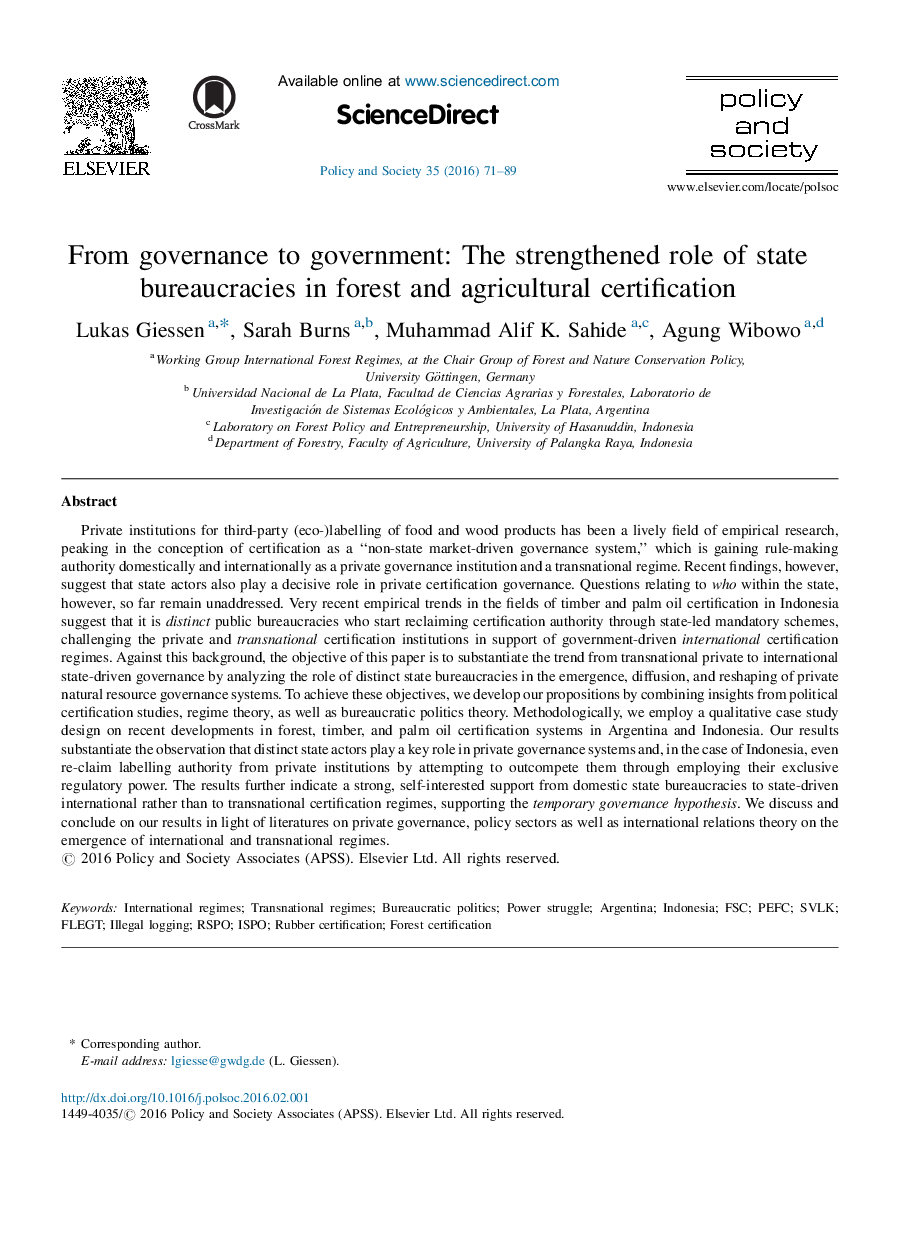| کد مقاله | کد نشریه | سال انتشار | مقاله انگلیسی | نسخه تمام متن |
|---|---|---|---|---|
| 5118408 | 1378162 | 2016 | 19 صفحه PDF | دانلود رایگان |
عنوان انگلیسی مقاله ISI
From governance to government: The strengthened role of state bureaucracies in forest and agricultural certification
ترجمه فارسی عنوان
از حکومت به حکومت: نقش تقویت بوروکراتیک دولتی در گواهی جنگل و کشاورزی
دانلود مقاله + سفارش ترجمه
دانلود مقاله ISI انگلیسی
رایگان برای ایرانیان
کلمات کلیدی
ترجمه چکیده
مؤسسات خصوصی برای برچسب زدن به محصولات شخص ثالث (زیست محیطی) محصولات غذایی و صنایع غذایی، یک زمینه پر جنب و جوش از تحقیقات تجربی بوده است، که در مفهوم صدور گواهینامه به عنوان نظام حاکمیت بازار نهادینه شده است که به عنوان یک نهاد حکومت خصوصی و یک رژیم فراملی، اقتدار قانونی را در داخل و خارج از کشور به دست می آورد. یافته های اخیر، با این حال، نشان می دهد که بازیگران دولتی نیز نقش تعیین کننده ای در مدیریت صدور گواهینامه خصوصی ایفا می کنند. با این حال، سوالات مربوط به افرادی که در داخل کشور هستند، تا کنون مورد توجه قرار نگرفته اند. روند اخیر تجربی اخیر در زمینه صدور گواهینامه چوب و نخل در اندونزی نشان می دهد که بوروکراسی عمومی متمایز است که شروع به احیای مجوز گواهینامه از طریق طرح های اجباری دولت می کند و به موسسات صدور گواهینامه خصوصی و بین المللی برای حمایت از رژیم های صدور گواهینامه بین المللی . در این زمینه، هدف این مقاله این است که روند تجزیه و تحلیل از حکومت های بین المللی خصوصی به حکومت بین المللی با تحلیل نقش تحریم های دولتی متمایز در ظهور، انتشار و تغییر نظام های حاکمیت منابع طبیعی خصوصی، اثبات شود. برای دستیابی به این اهداف، گزاره های ما را با ترکیب بینش از مطالعات صدور گواهینامه سیاسی، نظریه رژیم، و همچنین نظریه سیاست بوروکراتیک، توسعه می دهیم. از لحاظ روش شناختی، ما یک طرح مطالعه کیفی کیفی را در مورد پیشرفت های اخیر در سیستم های صدور گواهینامه جنگل، چوب و روغن نخل در آرژانتین و اندونزی به کار می بریم. نتایج ما اثبات این نکته را ثابت می کند که بازیگران متشکل از دولت نقش مهمی در نظام های حکومتی خصوصی ایفا می کنند و در مورد اندونزی حتی از طریق استفاده از قدرت نظارتی منحصربفردانه خود را مجددا از طریق نهادهای خصوصی مجاز می شمارند. نتایج بیشتر نشان می دهد حمایت قوی و خودمختار از ادارات دولتی دولتی به نظام های صدور گواهینامه بین المللی به جای نظام های فراملیتی، حمایت از فرضیه های موقت دولت است. ما در مورد نتایج خود با توجه به ادبیات در مورد حاکمیت خصوصی، بخش های سیاستگذاری و همچنین نظریه روابط بین المللی در مورد ظهور رژیم های بین المللی و فراملی بحث می کنیم و نتیجه می گیریم.
موضوعات مرتبط
علوم انسانی و اجتماعی
علوم اجتماعی
جغرافیا، برنامه ریزی و توسعه
چکیده انگلیسی
Private institutions for third-party (eco-)labelling of food and wood products has been a lively field of empirical research, peaking in the conception of certification as a “non-state market-driven governance system,” which is gaining rule-making authority domestically and internationally as a private governance institution and a transnational regime. Recent findings, however, suggest that state actors also play a decisive role in private certification governance. Questions relating to who within the state, however, so far remain unaddressed. Very recent empirical trends in the fields of timber and palm oil certification in Indonesia suggest that it is distinct public bureaucracies who start reclaiming certification authority through state-led mandatory schemes, challenging the private and transnational certification institutions in support of government-driven international certification regimes. Against this background, the objective of this paper is to substantiate the trend from transnational private to international state-driven governance by analyzing the role of distinct state bureaucracies in the emergence, diffusion, and reshaping of private natural resource governance systems. To achieve these objectives, we develop our propositions by combining insights from political certification studies, regime theory, as well as bureaucratic politics theory. Methodologically, we employ a qualitative case study design on recent developments in forest, timber, and palm oil certification systems in Argentina and Indonesia. Our results substantiate the observation that distinct state actors play a key role in private governance systems and, in the case of Indonesia, even re-claim labelling authority from private institutions by attempting to outcompete them through employing their exclusive regulatory power. The results further indicate a strong, self-interested support from domestic state bureaucracies to state-driven international rather than to transnational certification regimes, supporting the temporary governance hypothesis. We discuss and conclude on our results in light of literatures on private governance, policy sectors as well as international relations theory on the emergence of international and transnational regimes.
ناشر
Database: Elsevier - ScienceDirect (ساینس دایرکت)
Journal: Policy and Society - Volume 35, Issue 1, March 2016, Pages 71-89
Journal: Policy and Society - Volume 35, Issue 1, March 2016, Pages 71-89
نویسندگان
Lukas Giessen, Sarah Burns, Muhammad Alif K. Sahide, Agung Wibowo,
